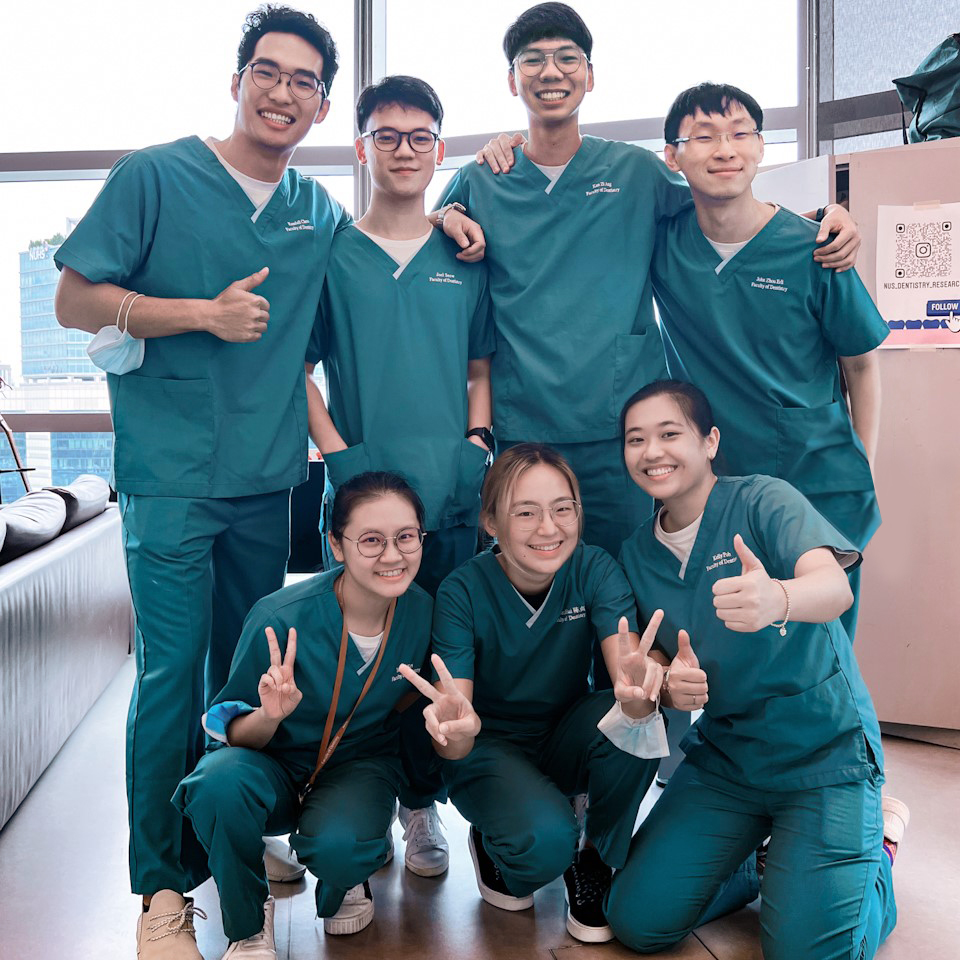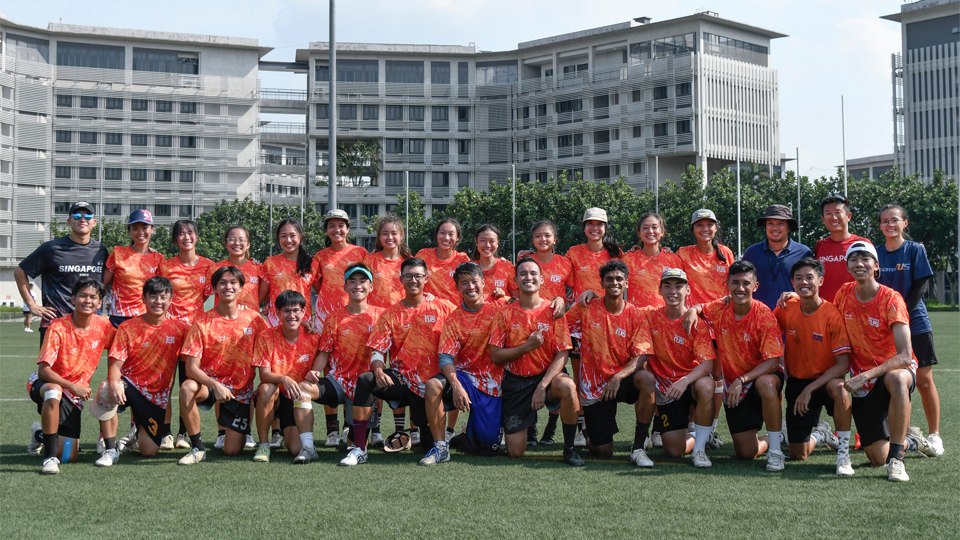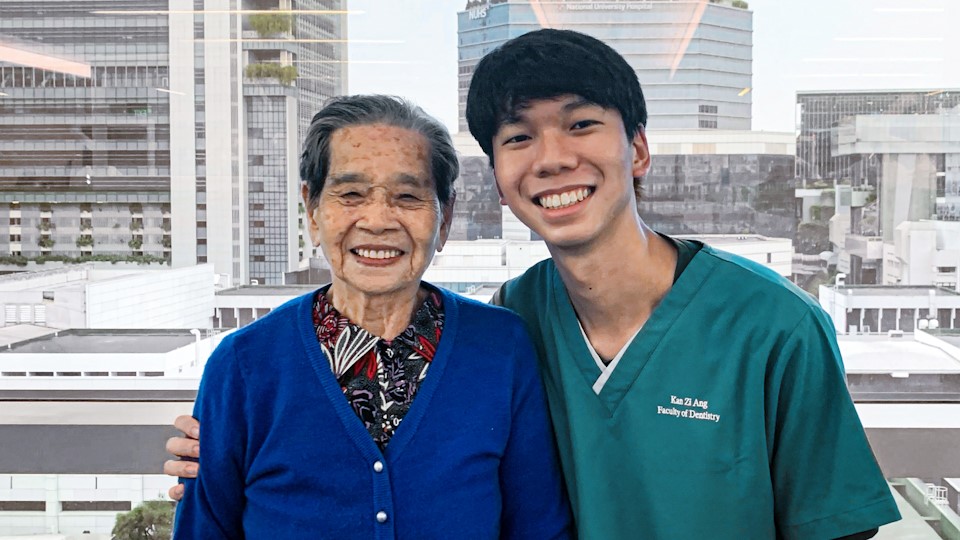The human touch
Ask Kan Zi Ang what he loves most about dentistry, and the sociable final-year NUS Faculty of Dentistry student would tell you that he finds interacting with patients and directly affecting their lives the most fulfilling part of his discipline.
But he didn’t always know that dentistry was what he wanted to pursue. While in National Service (NS) and trying to figure out what he should study in university, he spoke to a former schoolmate who had already enrolled in NUS Dentistry, and his interest was piqued by what he heard. He then went on to intern at a dental clinic after completing his NS, which helped confirm for him that dentistry was aligned with his personal goal of bettering the lives of others.
His volunteering stint with the Tiong Bahru Youth Network during his NS years further clarified his personal calling for socially impactful work and meaningful human interaction. He recounts: “I remember one time we were working with kids from lower-income families for a Christmas celebration event. To cultivate a spirit of giving and paying it forward, we contacted hospitals and got the kids to write the hospital staff handwritten thank-you notes, went carolling in the patients’ wards, and gave the kids presents. When I saw the joy on their faces and realised how my efforts had impacted them, it really solidified my desire to have a career that touches people’s lives.”
 Through the Tiong Bahru Youth network, Zi Ang (furthest back, left) brought the kids out to enjoy a performance at City Square Mall and take in the decorations.
Through the Tiong Bahru Youth network, Zi Ang (furthest back, left) brought the kids out to enjoy a performance at City Square Mall and take in the decorations.
From theory to practice
Upon entering NUS Dentistry, Zi Ang was delighted to discover its warm, supportive culture. Describing the environment as familial, Zi Ang shared that his cosy batch of 73 course mates are all on friendly terms, sharing notes and helping one another with their academic work. “In addition, I also have my own informal study group where a few of us share our notes on a common database. This is especially helpful for me when I need to catch up on lessons I have missed because of competitions, for instance,” he notes with appreciation.
 Zi Ang (second from right, back row) relaxing in between classes with his cluster group mates.
Zi Ang (second from right, back row) relaxing in between classes with his cluster group mates.
Zi Ang also encountered many dental instructors who have refined his understanding of the field of dentistry, and was particularly grateful to Dr Tan Ming Yi who specialises in prosthetic dentistry.


He also has some advice for aspiring applicants on preparing for the transition from Years 1 and 2, which focus on the more theoretical aspects of dentistry, to Years 3 and 4, when the curriculum shifts to become more patient-focused.


His top tip is to bone up on preparatory work and familiarise oneself with the dental procedures, as this has helped him stay calm and in turn, help the patient feel assured and confident in the hands of the dentist. To all who refuse to eat before a dentist visit for fear of being judged, Zi Ang had this humorous myth-buster to share: “No, we won’t judge you even if you have spinach stuck between your teeth. And no, brushing just before a visit doesn’t really help your case if you haven’t been brushing properly in the past six months. We will know!”
Teething problems
Besides devoting his days to dentistry, the 24-year-old is also an avid frisbee athlete who not only represents his faculty in the Inter-Faculty Games (IFG) as well as NUS in the Singapore University Games (SUnIG), but has also represented Singapore at the 2023 World Beach Ultimate Championships in California as part of the national frisbee team.
 Team Singapore (Zi Ang is fourth from left, second row) and Team USA at the 2023 World Beach Championships in California.
Team Singapore (Zi Ang is fourth from left, second row) and Team USA at the 2023 World Beach Championships in California.
Unsurprisingly, juggling school and frisbee is Zi Ang’s biggest challenge. He shares that it can be hard to keep up with his busy schedule, particularly when competition season ramps up, as he often has to devote his evenings and weekends to both NUS and national team training sessions.
To best handle his schedule, Zi Ang plans his time carefully and delegates certain days for studying and others for frisbee training. However, he has come to realise that it is equally important to carve out space to unwind and take care of himself. He always makes time for family dinner and loves to relax by doing sudoku or other logic puzzles.
From the field to the chair
The sheer amount of time that Zi Ang spends on both passions — dentistry and frisbee — has deepened his appreciation of how these disciplines translate across the playing field and the dental chair. Their common denominators? The mental resilience to perform under pressure, as well as the empathy to understand others. “For both frisbee and dentistry, it is key to be mentally prepared for contingencies and stay calm under all circumstances,” he asserts.
As frisbee is a team sport, practising empathy and understanding his teammates both on and off the playing field are also equally important for Zi Ang, who recently acted as line captain at the 2023 SUnIG. He found that a keen understanding of each player’s role as well as their personalities helped him deliver correction and feedback in a way that resonated with each individual.
 Zi Ang (first from right, first row) with Team NUS at the 2023 Singapore University Games.
Zi Ang (first from right, first row) with Team NUS at the 2023 Singapore University Games.


Sum of parts, a greater whole
While Singapore enjoys a high standard of living and quality dental care, Zi Ang hopes to see a change in the public perception of oral health to one where individuals recognise the importance of proactively taking care of their teeth. “A lot of people still see oral health as something they pay attention to only if they have a problem, but prevention is actually one of the most important parts of oral hygiene,” he clarified.
Looking ahead, Zi Ang hopes to provide excellent patient care to the Singapore community: “I think being able to look at a patient holistically to determine if there are any underlying root causes that should be addressed is the key to change.” To illustrate his point, he recounts how one of his patients was reluctant to quit smoking and improve his poor dental health. But only after talking more to the patient did Zi Ang realise that he used smoking as a way to pass time at his job which involved a lot of waiting around. This helped him suggest broader lifestyle interventions that went to the root of the issue, such as playing sudoku to replace the smoking habit.
Zi Ang also has a particular affinity with the elderly as he spent part of his childhood living with his doting grandparents. He plans to build upon this inclination and serve Singapore’s ageing population to the best of his ability: “Even when volunteering, I find I like to interact with the elderly. Given that Singapore has a fast-ageing population, I hope to work more with the elderly in the future and endeavour my best to understand their lifestyles, habits, as well as aspects of elderly care that I hope to become more competent in.”
 Zi Ang with his grandmother, who is wearing dentures that he made for her
Zi Ang with his grandmother, who is wearing dentures that he made for her